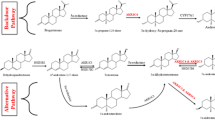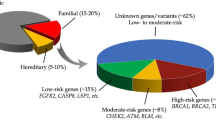Abstract
To evaluate the relationship of genetic polymorphisms of ERCC2 and ERCC4 genes, both involved in nucleotide excision repair (NER), and the risk of breast cancer, a hospital-based case-control study was conducted in Korea. Histologically confirmed breast cancer cases (n=574) and controls (n=502) with no present or previous history of cancer were recruited from three teaching hospitals in Seoul during 1995-2001. Information on selected characteristics was collected by interviewed questionnaire. ERCC2 Asp312Asn (G>A) was genotyped by single-base extension assay and ERCC4 Ser835Ser (T>C) by dynamic allele-specific hybridization system. Although no significant association was observed between the genetic polymorphisms and the risk of breast cancer, women with both ERCC2 A allele- and ERCC4 C allele-containing genotypes showed a 2.6-fold risk (95% CI: 1.02-6.48) of breast cancer compared to women concurrently carrying the ERCC2 GG and ERCC4 TT genotypes. The breast cancer risk increased as the number of "at risk" genotypes increased with a borderline significance (P for trend = 0.07). Interactive effect was also observed between ERCC4 genotype and body mass idnex (BMI) for the breast cancer risk; the ERCC4 C allele containing genotypes posed a 1.7-fold (95% CI: 0.96-2.93) breast cancer risk in obese women (BMI>25 kg/m2) with a borderline significance. Our finding suggests that the combined effect of ERCC2 Asp312Asn and ERCC4 Ser835Ser genotypes might be associated with breast cancer risk in Korean women.
Similar content being viewed by others
Article PDF
Author information
Authors and Affiliations
Rights and permissions
This is an Open Access article distributed under the terms of the Creative Commons Attribution Non-Commercial License (http://creativecommons.org/licenses/by-nc/3.0/) which permits unrestricted non-commercial use, distribution, and reproduction in any medium, provided the original work is properly cited.
About this article
Cite this article
Lee, SA., Lee, KM., Park, WY. et al. Obesity and genetic polymorphism of ERCC2 and ERCC4 as modifiers of risk of breast cancer. Exp Mol Med 37, 86–90 (2005). https://doi.org/10.1038/emm.2005.12
Published:
Issue date:
DOI: https://doi.org/10.1038/emm.2005.12
Keywords
This article is cited by
-
Characterizing excision repair cross-complementing family genes as drug resistance biomarkers in breast cancer
Beni-Suef University Journal of Basic and Applied Sciences (2023)
-
The link of ERCC2 rs13181 and ERCC4 rs2276466 polymorphisms with breast cancer in the Bangladeshi population
Molecular Biology Reports (2022)
-
Population attributable risks of modifiable reproductive factors for breast and ovarian cancers in Korea
BMC Cancer (2016)
-
Polymorphisms in DNA repair genes and breast cancer risk in Russian population: a case–control study
Clinical and Experimental Medicine (2016)
-
Association of XPF Levels and Genetic Polymorphism with Susceptibility to Ischemic Stroke
Journal of Molecular Neuroscience (2016)



